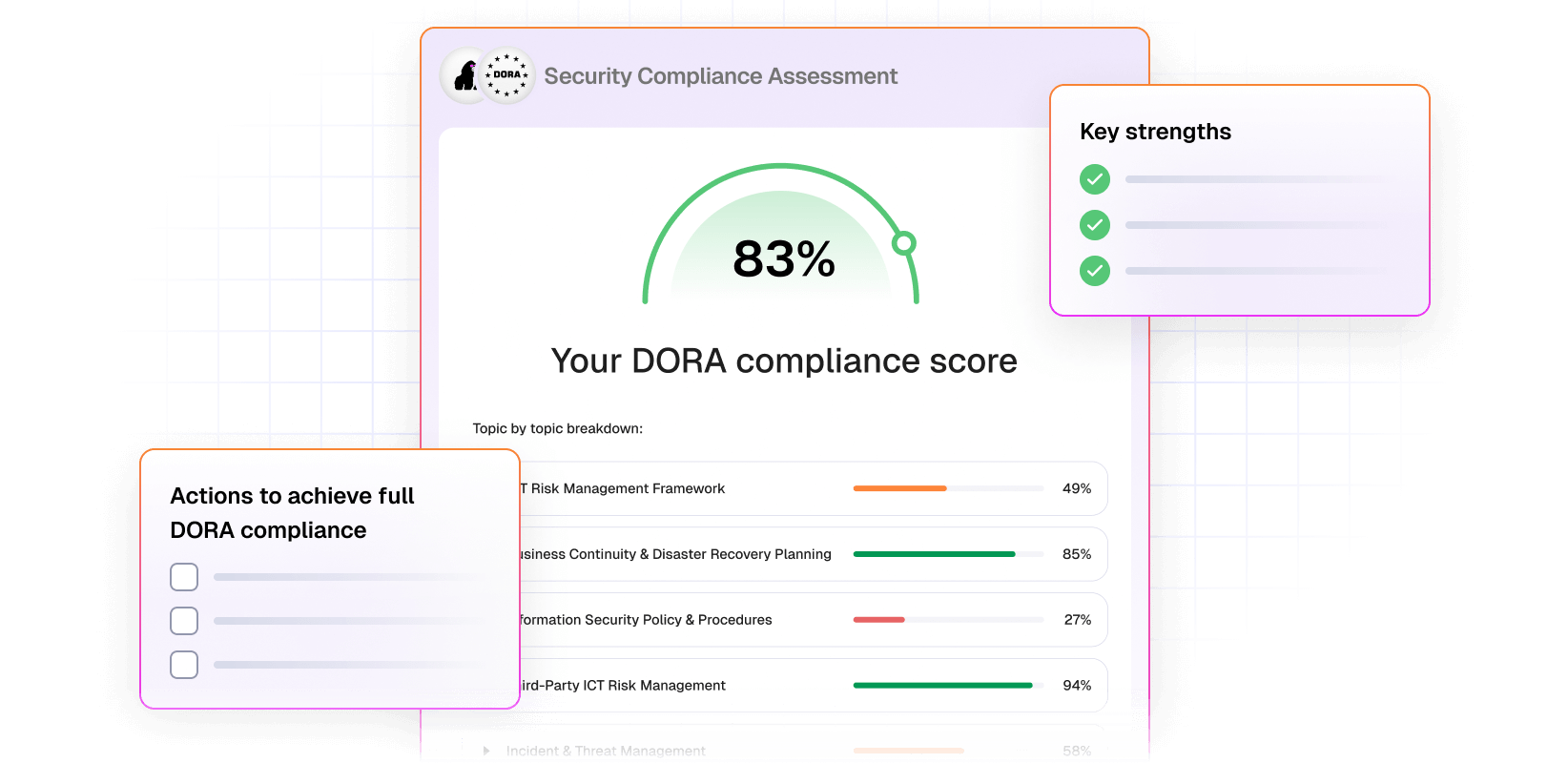Hungary’s financial and technological landscape has evolved rapidly over the last decade, with a steady rise in digital banking, fintech innovation, and widespread e-commerce adoption. In line with these developments, the European Union introduced the Digital Operational Resilience Act (DORA) to ensure a standard level of cyber resilience and operational continuity across all member states. In this post, we’ll examine how Hungary plans to implement DORA, whether this approach differs from other EU countries, and how the nation’s existing regulations already align with DORA principles. We’ll also include a short list of DORA auditors in Hungary for organizations seeking guidance.

Assess your DORA readiness for free!
Evaluate your organization’s compliance gaps and find areas for improvement—no prior DORA knowledge needed.
Why DORA matters in Hungary
While DORA explicitly targets financial entities—banks, insurers, payment providers, and investment firms—its influence extends to any organization that supplies critical IT services to these institutions. In Hungary, the Magyar Nemzeti Bank (MNB) oversees the financial sector and has historically placed strong emphasis on risk management and consumer protection. By introducing uniform EU standards for ICT risk management, incident reporting, and vendor oversight, DORA reinforces many of the measures MNB has already promoted. For Hungarian businesses, DORA codifies a robust, continent-wide approach that enhances consumer confidence and market stability.
PRO TIP
Start with a gap analysis that maps your current MNB compliance posture to DORA’s requirements. This can help you identify overlaps and prioritize updates for any missing governance or reporting elements.
Is Hungary’s approach different from other EU member states?
All EU nations adopt DORA within the overarching framework set by Brussels, but each adapts it to existing regulatory structures. In Hungary, financial regulation primarily runs through the MNB, which also issues detailed guidelines on operational resilience and IT risk. This centralized oversight can ease the integration of DORA compared to countries with multiple, fragmented regulatory bodies. Still, Hungarian entities working across borders must be alert to any local nuances, such as unique reporting deadlines or supplementary requirements set by the MNB. Overall, the core obligations—stronger ICT governance, standardized incident reporting protocols, and tighter control of third-party providers—remain the same throughout the EU.
PRO TIP
Subscribe to MNB’s regulatory updates and newsletters to catch any DORA-related clarifications early. These will help ensure your internal policies reflect both the EU-wide regulation and Hungary-specific interpretations.
Hungary’s existing regulations that align with DORA
Hungary has already enacted several laws and guidelines designed to maintain high standards of cybersecurity and operational stability. Below is an overview of key regulations and how they connect to DORA’s goals:
| Hungarian regulation or measure | Focus area | Connection to DORA |
| MNB decrees and guidelines on risk management and ICT security | Require financial institutions to have robust IT controls, vendor oversight, and incident response plans | Overlaps heavily with DORA’s requirements for structured ICT governance, ongoing risk assessments, and third-party supervision |
| Act on Cybersecurity of State and Municipal Information Systems | Establishes cybersecurity obligations for critical infrastructure operators, which can include financial entities | Complements DORA’s focus on continuous cyber risk monitoring and breach reporting |
| GDPR enforcement (Adatvédelmi Törvény) | Maintains strict data privacy controls and breach notifications | Aligns with DORA’s emphasis on safeguarding sensitive information and timely incident disclosure |
Because these regulations already promote risk-aware operations, Hungarian financial institutions may find DORA more of a refinement than a dramatic shift. That said, DORA’s broad scope and cross-border uniformity may introduce additional reporting mechanisms or stricter oversight of IT vendors compared to Hungary’s national rules alone.
PRO TIP
Use existing MNB risk documentation (like continuity plans, outsourcing registers, and incident logs) as your DORA readiness core. These internal assets will make it easier to adapt to DORA’s formatting and escalation timelines.
Impact on all industries
While the direct subject of DORA is the financial sector, the Act’s requirements inevitably spill over into other industries. Tech vendors, consultancy firms, and even smaller software providers that serve financial institutions must meet higher standards under DORA’s rules.
For instance, a startup offering cloud-based payment solutions to banks could trigger incident reporting obligations if a security breach affects those banks’ operations. As Hungary’s digital economy continues to expand—particularly in Budapest’s growing startup scene—organizations across the spectrum should be prepared for elevated scrutiny of their cyber practices.
PRO TIP
If you provide services to financial clients, expect DORA-specific requirements to be written into contracts. Start drafting templated responses now for vendor risk assessments, audit rights, and breach protocols.
List of DORA auditors in Hungary
DORA does not maintain an official list of designated auditors, but several reputable firms in Hungary specialize in ICT risk management, cybersecurity, and regulatory compliance. Below is a concise list of potential partners:
| Firm | Primary expertise | Additional notes |
| Deloitte Hungary | Cyber risk, IT governance, regulatory audits | Global network with local specialists well-versed in Hungarian regulations |
| KPMG Hungary | Operational resilience, risk management, internal controls | Known for advising major financial institutions and insurance companies |
| PwC Hungary | Cybersecurity, data privacy, incident response | Offers tailored solutions for local and multinational organizations |
| EY Hungary | IT audits, digital transformation, governance, risk & compliance | Experienced in handling cross-border EU directives |
| BDO Hungary | Internal controls, risk assurance, compliance advisory | Often caters to mid-market businesses and financial firms |
| Kürt | Hungarian-based cybersecurity consultancy | Specializes in incident response and technical risk assessments |
When selecting an auditor, confirm their familiarity with MNB guidelines, Hungary’s cybersecurity laws, and the broader EU framework underpinning DORA. A proven track record in the financial sector is also important for streamlining the compliance process.
PRO TIP
When selecting an audit partner, ask for examples of prior DORA readiness assessments or work on PSD2/NIS implementations—they offer a reliable benchmark for EU-aligned digital resilience.
Hungary and DORA: Build smarter resilience with CyberUpgrade
Hungary’s digital banking boom, vibrant fintech sector, and expanding e-commerce ecosystem have made it a regional tech leader—but with digital growth comes operational risk. As the EU enforces the Digital Operational Resilience Act (DORA), Hungarian financial institutions must meet new, standardized expectations. CyberUpgrade helps you get there—quickly, clearly, and cost-effectively.
Our platform guides you through Hungary’s evolving compliance landscape, translating existing Magyar Nemzeti Bank (MNB) rules into actionable DORA-aligned controls. You’ll pinpoint ICT governance gaps, manage third-party risks, and build audit-ready reports that satisfy both EU and Hungarian regulators—without reinventing your current compliance setup.
Already compliant with MNB ICT guidelines? CyberUpgrade highlights what’s missing for full DORA coverage—especially around incident response timelines, vendor classification, and EU-wide breach escalation rules.
Whether you’re a bank, a fintech startup in Budapest, or a software vendor supporting regulated institutions, CyberUpgrade gives you a competitive edge in a market that’s about to demand much more.
A resilient path forward
Hungary’s commitment to modernizing its financial sector aligns naturally with DORA’s push for a more secure and stable digital environment. While new measures may require additional coordination—particularly for organizations managing multiple EU markets—DORA also provides a roadmap for strengthening trust among customers, partners, and regulators. By building on Hungary’s existing regulations and improving cross-border uniformity, DORA can help local businesses thrive in an interconnected, fast-evolving economic landscape.

Assess your DORA readiness for free!
Evaluate your organization’s compliance gaps and find areas for improvement—no prior DORA knowledge needed.








